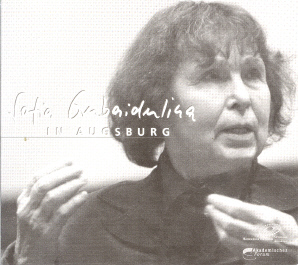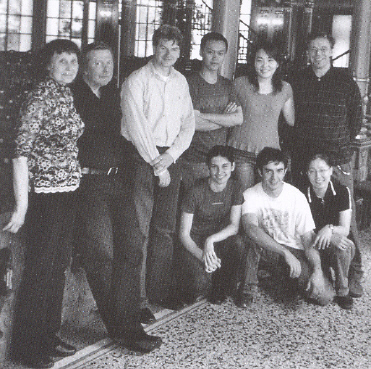The combination of works recorded here with Stefan Hussong and Berger's students at the Hochschule Augsburg is another demonstration (following swiftly our review of Bach/Biber/Barry Guy) that new music and older music do not contradict each other; instead the perspective and experiences provided by the most recent music can provide surprising approaches to older music.
And secondly it is a superb demonstration of the potential in chamber music of the accordion, until not long ago the preserve of popular music, as was the cello that of 'serious' classical music. The Bach gamba sonatas (originally themselves arrangements with checquered histories, as described by Andreas Ballstaedt) sound lively enough, and should not be thought sacrilegious despite the historicism of our musical life. The sonorities merge and separate intriguingly and these accounts are well worth hearing, if finally not as interesting to me as the memorable performances with chamber organ given by father and daughter Neary, which ought to be released on CD (three movements of the first sonata were arranged for organ in Bach's own day).
The compelling reason to explore this CD is the Romanian born, Germany based composer
Adriana Hölszky (b. 1953) new to me, but with many entries to find under Google search. We are told that her styles, with radical and unpredictable sonorities, are renewed for each composition, which include four operas. There is a pervasive theatricality, and she avoids sounds that are familiar or 'beautiful'.
Miserere which expores systematically the many transformations of basic timbre and articulation that the modern accordion has in its palate.
Nouns to Nouns is a sequence of miniatures based on lines by e e cummings. Cloud and Moon combines the two instruments in changing surfaces 'as if one instrument were performing, not two', a challenging and memorable piece, the most rewarding, leaving us wanting to hear more by this composer.
Sofia Gubaidulina in Augsburg
 More straightforwardly recommendable to the 'ordinary listener' (if such exists) is a lovely CD of music by Sofia Gubaidulina.
More straightforwardly recommendable to the 'ordinary listener' (if such exists) is a lovely CD of music by Sofia Gubaidulina.
Gubaidulina's music has a pervading spiritual quality but never embraces the easy and all too popular ethos of the 'holy minimalist' composers which I, to be frank, abhor; "I am a religious person...and by 'religion' I mean re-ligio, the re-tying of a bond...restoring the legato of life. Life divides man into many pieces...There is no weightier occupation than the recomposition of spiritual integrity through the composition of music." (SG)..
This elegant and lovingly produced book-style CD is presented with numerous photo illustrations, giving a real feeling of the teaching event commemmorated, and a page of the score of In croce, one of Gubaidulina's most successful and often performed works (I first experienced it at the Huddersfield Festival in the alternative version for cello and organ). Here is a masterly account by Berger and Hussong, superbly recorded.
Quarternion (1996) is given by four student cellists, so good that I could not easily decide whether Berger was leading the quartet himself - he doesn't! He does however play the solo part, with six of his students in the newest work here, Am Rande des Abgrunds (2002) for seven cellos and two "Waterphones" which impart an exquisite gloss to the sumptuous sound of the cellos.
Julius Berger is without question one of the most interesting cellists now before the public - in many countries and several continents, but inexplicably never heard in UK. The recording and presentation is fine, with the reservation that the texts are only in German. However, there is a great deal of material about Gubaidulina to be found easily on the Web (e.g. see a detailed analysis of In Croce) and her music speaks so eloquently that this should not dissuade you from exploring a special disc.

Further information on the interpreters: www.stefan-hussong.de and www.juliusberger.de
(If you are unfamiliar with the delights of the self-sufficient cello octet, do look up my reviews of the Spanish/Dutch Conjunto Iberico.)



